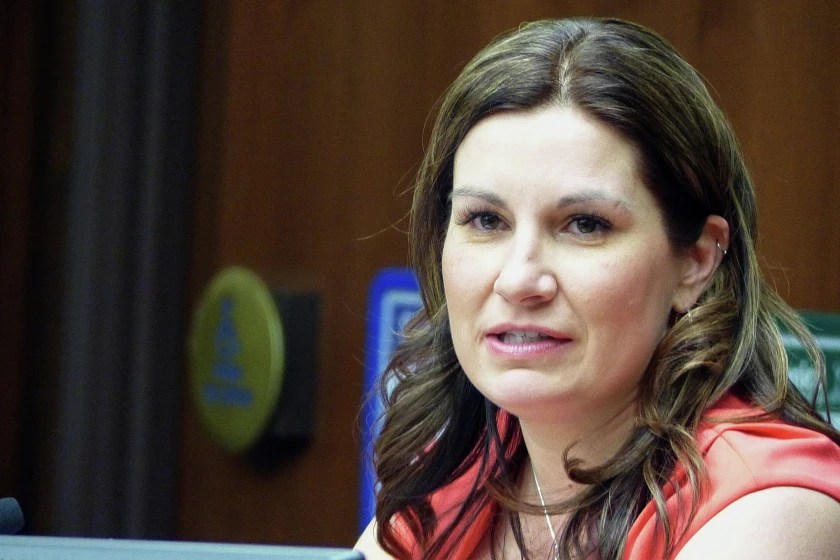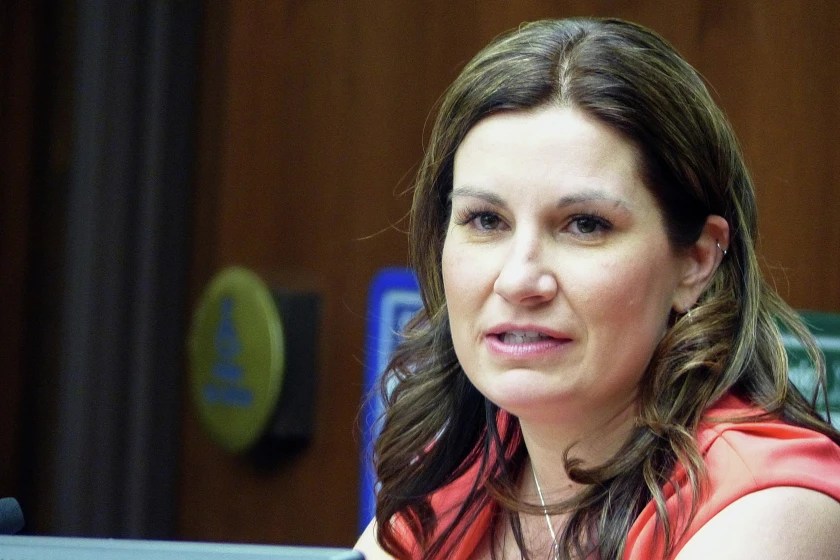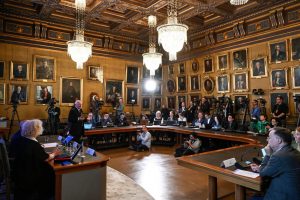
Minnesota representative sues Keith Ellison, says deepfake ban violates First Amendment
Minnesota Rep. Mary Franson, R-Alexandria, filed a lawsuit against Attorney General Keith Ellison on Sept. 27 claiming Minnesota’s ban on deepfakes and AI in political contexts is a violation of the First Amendment’s right to free speech.
Franson sued alongside Christopher Patrick Kohls, a satirical political commentator otherwise known as Mr. Reagan. The two are represented by the Hamilton Lincoln Law Institute and the Upper Midwest Law Center.
A similar lawsuit was brought forth earlier this month in Kohls’ and Vice President Kamala Harris’ home state of California, and is still pending.
Minnesota Rep. Mary Franson, R-Alexandria, speaks during a meeting of the House Subcommittee on Child Care Access and Affordability on Feb. 27, 2017. (Forum News Service)
Kohls and Franson argue in their complaint that the First Amendment protects political speech, including parody. They add that Minnesota’s ban does not include an exception for parody.
“In so doing, Minnesota created a more dangerous attack on truth, speech, and free elections than the issue it attempts to resolve,” Franson and Kohls say in the complaint.
HLLI said in a press release that Kohls earns his living through the content — some of which has been centered around Gov. Tim Walz.
One of Kohls’ videos of Kamala Harris prompted Minnesota Sen. Amy Klobuchar to weigh in on the topic publicly, sharing her disapproval after Elon Musk retweeted the viral video in July.
“If @elonmusk and X let this go and don’t label it as altered AI content, they will not only be violating X’s own rules, they’ll be unleashing an entire election season of fake AI voice and image-altered content with no limits, regardless of party,” Klobuchar said on X.
The video in question manipulated Harris’ voice to say things like “Joe taught me rule No. 1: Carefully hide your total incompetence.” Franson retweeted this video, and has also shared AI-manipulated memes of Walz, including one from Sept. 16 that depicted Walz “waving so hard his arms flew off.”
The complaint says Franson has always communicated with her constituents through social media. Her bio on X, formerly known as Twitter, reads, “Memes, Jesus, Coffee (not necessarily in that order).”
Related Articles
Departures in House create crucial Republican targets in the fight for majority control
Harris and Trump battle for labor support as dockworkers suspend strike
Filing in Trump case details remarkable schism with Pence over rejecting 2020 election loss
Child care burst into the national spotlight at the Vance-Walz debate. Here’s why
Harris’ emphasis on maternal health care is paying dividends with Black women voters
According to the complaint, Franson “wishes to continue to see and share memes and AI-generated content that — like Kohls’ videos — mocks politicians with whom she disagrees.”
Minnesota passed the ban on deepfakes well before the general election on Nov. 5. It was one of six states to pass this legislation in 2023. Now, 15 states have passed similar legislation.
“It could be very difficult for the average person to distinguish truth from fiction, and particularly when you get close to an election, there isn’t time for the person depicted to clarify to the public, ‘Hey, that wasn’t me,’ ” Rep. Zack Stephenson, DFL-St. Paul, who sponsored the bill, said in a Thursday interview with Forum News Service.
He added, “This isn’t a hypothetical, this is not far-fetched,” noting one example of an AI-generated robocall that impersonated President Joe Biden discouraging democrats from voting in the state’s January primary.
“Minnesotans deserve fair and free elections, and they deserve to not be subject to misinformation and lies in election seasons,” Stephenson added. “That’s why we need the law, to protect people as they are actually voting.”
Secretary of State Steve Simon has also shown support for this law.
“AI, which powers deepfakes, is not in and of itself a threat to our elections or our democracy, but it is an emerging and powerful amplifier of existing threats, such as disinformation,” Simon said during a committee hearing in February.
Simon explained that he believes if AI-generated deepfakes are used as a tool to influence voters, it could result in election disruption and disenfranchisement.
“In the hands of those who want to mislead, AI tools can represent a revolution,” he added.
Stephenson responded to the claims from Franson about free speech, saying there are well-established limits to free speech, including libel and defamation.
Part of the deepfake ban states that a candidate running for office may be disqualified if they have been found guilty of engaging in deepfakes “to influence an election.” Stephenson added the concept isn’t necessarily new in Minnesota.
“Minnesota has a law that is very old called the Minnesota Care Campaign Practices Act,” Stephenson said. “Under that law, there are various things that a candidate can do that can result in disqualification in an election. So this is not a new concept, and adding deepfakes to that law is consistent with the other things in that law.”
In its press release, HLLI said they “intend to move a motion for preliminary injunction shortly.”
Franson and Ellison declined to provide a comment for this story
Related Articles
Walz authorizes Minnesota National Guard to assist with Hurricane Helene response
In vice presidential debate, Tim Walz says son ‘witnessed’ 2023 St. Paul shooting
5 ways Gov. Tim Walz and comedian Jim Gaffigan, who plays him on ‘SNL,’ are more alike than you think
One year after law’s passage, immigrants in Minnesota embracing chance to get driver’s license
Minnesota elections office latest to receive suspicious package

Minnesota representative sues Keith Ellison, says deepfake ban violates First Amendment
Minnesota Rep. Mary Franson, R-Alexandria, filed a lawsuit against Attorney General Keith Ellison on Sept. 27 claiming Minnesota’s ban on deepfakes and AI in political contexts is a violation of the First Amendment’s right to free speech.
Franson sued alongside Christopher Patrick Kohls, a satirical political commentator otherwise known as Mr. Reagan. The two are represented by the Hamilton Lincoln Law Institute and the Upper Midwest Law Center.
A similar lawsuit was brought forth earlier this month in Kohls’ and Vice President Kamala Harris’ home state of California, and is still pending.
Minnesota Rep. Mary Franson, R-Alexandria, speaks during a meeting of the House Subcommittee on Child Care Access and Affordability on Feb. 27, 2017. (Forum News Service)
Kohls and Franson argue in their complaint that the First Amendment protects political speech, including parody. They add that Minnesota’s ban does not include an exception for parody.
“In so doing, Minnesota created a more dangerous attack on truth, speech, and free elections than the issue it attempts to resolve,” Franson and Kohls say in the complaint.
HLLI said in a press release that Kohls earns his living through the content — some of which has been centered around Gov. Tim Walz.
One of Kohls’ videos of Kamala Harris prompted Minnesota Sen. Amy Klobuchar to weigh in on the topic publicly, sharing her disapproval after Elon Musk retweeted the viral video in July.
“If @elonmusk and X let this go and don’t label it as altered AI content, they will not only be violating X’s own rules, they’ll be unleashing an entire election season of fake AI voice and image-altered content with no limits, regardless of party,” Klobuchar said on X.
The video in question manipulated Harris’ voice to say things like “Joe taught me rule No. 1: Carefully hide your total incompetence.” Franson retweeted this video, and has also shared AI-manipulated memes of Walz, including one from Sept. 16 that depicted Walz “waving so hard his arms flew off.”
The complaint says Franson has always communicated with her constituents through social media. Her bio on X, formerly known as Twitter, reads, “Memes, Jesus, Coffee (not necessarily in that order).”
Related Articles
Departures in House create crucial Republican targets in the fight for majority control
Harris and Trump battle for labor support as dockworkers suspend strike
Filing in Trump case details remarkable schism with Pence over rejecting 2020 election loss
Child care burst into the national spotlight at the Vance-Walz debate. Here’s why
Harris’ emphasis on maternal health care is paying dividends with Black women voters
According to the complaint, Franson “wishes to continue to see and share memes and AI-generated content that — like Kohls’ videos — mocks politicians with whom she disagrees.”
Minnesota passed the ban on deepfakes well before the general election on Nov. 5. It was one of six states to pass this legislation in 2023. Now, 15 states have passed similar legislation.
“It could be very difficult for the average person to distinguish truth from fiction, and particularly when you get close to an election, there isn’t time for the person depicted to clarify to the public, ‘Hey, that wasn’t me,’ ” Rep. Zack Stephenson, DFL-St. Paul, who sponsored the bill, said in a Thursday interview with Forum News Service.
He added, “This isn’t a hypothetical, this is not far-fetched,” noting one example of an AI-generated robocall that impersonated President Joe Biden discouraging democrats from voting in the state’s January primary.
“Minnesotans deserve fair and free elections, and they deserve to not be subject to misinformation and lies in election seasons,” Stephenson added. “That’s why we need the law, to protect people as they are actually voting.”
Secretary of State Steve Simon has also shown support for this law.
“AI, which powers deepfakes, is not in and of itself a threat to our elections or our democracy, but it is an emerging and powerful amplifier of existing threats, such as disinformation,” Simon said during a committee hearing in February.
Simon explained that he believes if AI-generated deepfakes are used as a tool to influence voters, it could result in election disruption and disenfranchisement.
“In the hands of those who want to mislead, AI tools can represent a revolution,” he added.
Stephenson responded to the claims from Franson about free speech, saying there are well-established limits to free speech, including libel and defamation.
Part of the deepfake ban states that a candidate running for office may be disqualified if they have been found guilty of engaging in deepfakes “to influence an election.” Stephenson added the concept isn’t necessarily new in Minnesota.
“Minnesota has a law that is very old called the Minnesota Care Campaign Practices Act,” Stephenson said. “Under that law, there are various things that a candidate can do that can result in disqualification in an election. So this is not a new concept, and adding deepfakes to that law is consistent with the other things in that law.”
In its press release, HLLI said they “intend to move a motion for preliminary injunction shortly.”
Franson and Ellison declined to provide a comment for this story
Related Articles
Walz authorizes Minnesota National Guard to assist with Hurricane Helene response
In vice presidential debate, Tim Walz says son ‘witnessed’ 2023 St. Paul shooting
5 ways Gov. Tim Walz and comedian Jim Gaffigan, who plays him on ‘SNL,’ are more alike than you think
One year after law’s passage, immigrants in Minnesota embracing chance to get driver’s license
Minnesota elections office latest to receive suspicious package


